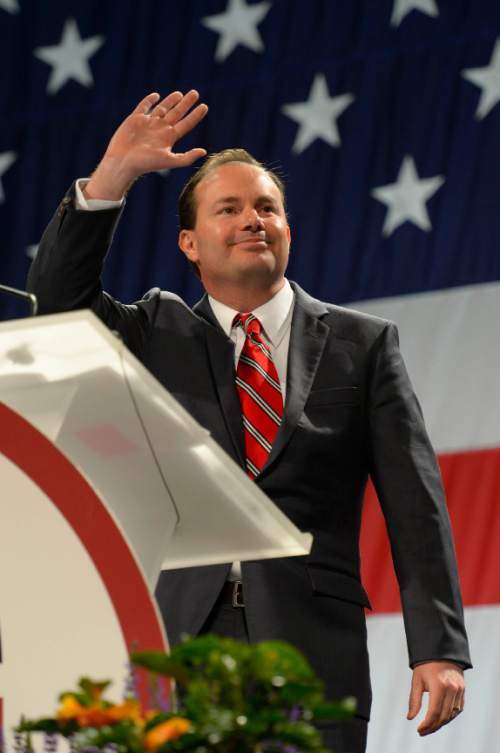This is an archived article that was published on sltrib.com in 2015, and information in the article may be outdated. It is provided only for personal research purposes and may not be reprinted.
Sen. Mike Lee is the first major Utah officeholder to say he is taking both routes available to reclaim the Republican nomination in 2016, even as the changed election system remains mired in legal challenges.
That means the first-term senator will once again seek the support of GOP delegates in the state's traditional convention system and he'll also send out an army of volunteers and workers to collect more than 28,000 signatures, in the new petition route to the primary ballot.
His campaign manager, Jordan Hess, said it would be "political malpractice not to vigorously pursue both paths."
Candidates can start collecting signatures to reach the primary ballot after Jan. 1, though the state Republican Party has vehemently opposed the petition process. Party leaders, including Chairman James Evans, says anyone seeking to represent the GOP must gain at least 40 percent of the vote in the convention and says the party will go back to court to defend that position.
"As a party we prefer that our Republican candidates don't take the petition route, that they stick with the system that has proven to be successful for Utah," Evans said.
The Legislature passed the dual-track system as a compromise between party traditionalists and a group led by former Gov. Mike Leavitt called Count My Vote that wanted to drop the convention system in favor of direct primaries. The argument for conventions is that it gives average Utahns a chance to win the nomination by reaching out to delegates, without the need for a big-money campaign. The argument against them is that conventions are dominated by people who are either more conservative or liberal than the average Utahns, boosting candidates who don't represent the majority.
Lee is one of the most conservative members of Congress and he rode strong tea-party support in the state convention in 2010 to defeat three-term Sen. Bob Bennett. Lee previously has said he would use both routes toward re-election but on Wednesday, he formally ordered his campaign staff to move forward to gather signatures.
While saying he's a supporter of the convention system, Lee said in a statement: "I have always supported efforts to increase voter participation. Tweaks to the primary election system have been advanced in the past and I am hopeful that with these reforms more Utahns than ever will participate in the political process."
In contrast, Rep. Jason Chaffetz says he's going to take only one route to the ballot: the convention.
"I'll put my fate in the hands of those attending the caucus meetings," the congressman from Utah County said. "It's the way I plan to approach it this year."
Signature gathering is expensive and onerous, Chaffetz added, and there's only a short time period from filing to the caucuses where delegates to the convention are picked. He's frustrated with how the change in procedure, the Republican Party court battle and the Legislature's decisions have left candidates and potential candidates not knowing how the ultimate process will shake out.
"I wish there was more clarity, given how close the actual election really is," Chaffetz said. "I hate changing the rules of the road when an election is upon us."
Other members of Utah's federal delegation, including Rep. Mia Love's campaign, remain unsure how to proceed.
"We're just still kind of looking at it, still haven't made final decisions," said Dave Hansen, Love's campaign manager.
If Love gathers signatures, she'll also participate in the convention.
While signature gathering is expensive, Hansen notes, it is a good way to gather names of supporters that he says are "quite valuable" for the election.
That's part of the reason Lee wants to pass petitions. His campaign sees it as a way to continue reaching out to Utah voters and a way to ward off a potential challenge. At this point, no Republican has announced a bid to unseat Lee.
Following a court ruling by U.S. District Judge David Nuffer, any GOP candidate collecting signatures must ensure that each person who signs is a registered Republican. The rule doesn't apply to Democrats, who have an open primary system.
Evans and the GOP want to return to court to obtain a ruling that the party can disqualify any Republicans who don't claim at least 40 percent of the delegate support in conventions. State elections officials at the lieutenant governor's office interpret the law to allow candidates to reach the ballot by signatures alone or through the convention on April 23.



